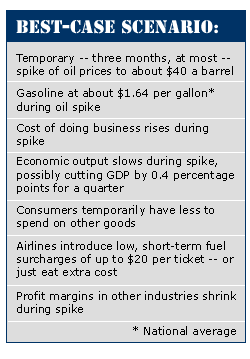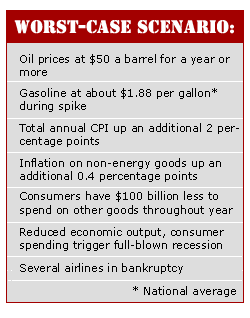NEW YORK (CNN/Money) -
When most U.S. economists talk about the impact of a possible war with Iraq, they assume that the war would be over quickly and that any spike in oil prices resulting from the war would only be temporary.
But what if that assumption is mistaken?

If the war somehow drags on for a year or more, or if Saddam Hussein or parties sympathetic to him manage to seriously disrupt the flow of oil from the Middle East during the war, the price of oil could climb to $40 or even $50 per barrel, and stay there for a while, seriously damaging the U.S. economy.
Economists have some rules of thumb to measure the economic impact of higher oil prices -- every $10 increase in the price of a barrel of oil, sustained for a year or more, cuts gross domestic product (GDP), the broadest measure of the economy, by about 0.4 percentage points and adds about one percentage point to the consumer price index (CPI), a key gauge of consumer price inflation.
But these rules of thumb only really apply to an economy operating in a vacuum. In the United States' real, very messy economy -- still recovering from a recession that began in March 2001, last year's terror attacks and more than 1.5 million job cuts -- a spike in the price of oil to, say, $50, sustained for a year, isn't going to just cut 0.8 percentage points from annual GDP growth. It would cause a recession.
"This economy is very vulnerable to shock, external or internal, such as a war or a sustained increase in oil prices," said Wayne Ayers, chief economist at Fleet Boston Financial Corp. and a former economist at the Federal Reserve.

And, contrary to the economists' model of oil price's impact on inflation, not all consumer prices would march upward in lockstep with oil. Gasoline and home-heating oil prices would rise, obviously, but many other industries would be forced to eat the higher cost of doing business, at least at first, forcing profit margins down.
Merrill Lynch cut its second-half 2002 earnings estimates for petrochemical companies Lyondell Chemical Co. (LYO: up $0.02 to $12.54, Research, Estimates) and Millennium Chemicals Inc. (MCH: up $0.34 to $10.98, Research, Estimates) Tuesday, for example, citing higher crude oil prices.
The struggling airline industry would be most sensitive to higher prices; jet fuel is its second-largest expense. Airlines periodically add fuel surcharges to ticket prices, but they couldn't raise prices at will in this worst-case scenario without chasing customers away.
"Any surcharge more than about $20 is really going to be difficult for passengers to swallow," said aviation industry consultant Michael Miller, of the Miller Air Group.
| Related stories
|

|
|
|
|
While the airline industry could probably survive the temporary spike in prices anticipated by the best-case war scenario, a sustained spike would likely spell bankruptcy for many carriers.
A $10 increase in the price of a barrel of oil, sustained for more than a year, could add 0.2 percentage points to consumer prices beyond energy, reflecting the increased costs of production, according to analysis by Sung Won Sohn, chief economist at Wells Fargo & Co.
"When the energy price goes up, it has a ripple effect through the economy because virtually everything is affected by energy," Sohn said.
Meanwhile, for every $10 price increase for a barrel of oil, consumers would spend about $50 billion extra on energy products, according to estimates by Deutsche Bank Securities chief economist Peter Hooper, meaning they would have that much less to spend on other goods.
Of course, that $50 billion wouldn't just disappear into the ether -- a good bit of it would go to U.S. gas stations and oil companies, meaning some parts of the U.S. economy would benefit.
But even though the U.S. economy is far less dependent on oil for its operation than it was in the 1970s, when an Arab oil embargo crippled it, a shortage of oil from the Middle East would still put a serious dent in production activity.
"If we did double the price of oil, my intuition is the economy would grind to a halt in the short run," said Paul Kasriel, economist at Northern Trust Co. "That would suggest a severe oil shortage, meaning we couldn't produce goods and services at the same rate."

|

